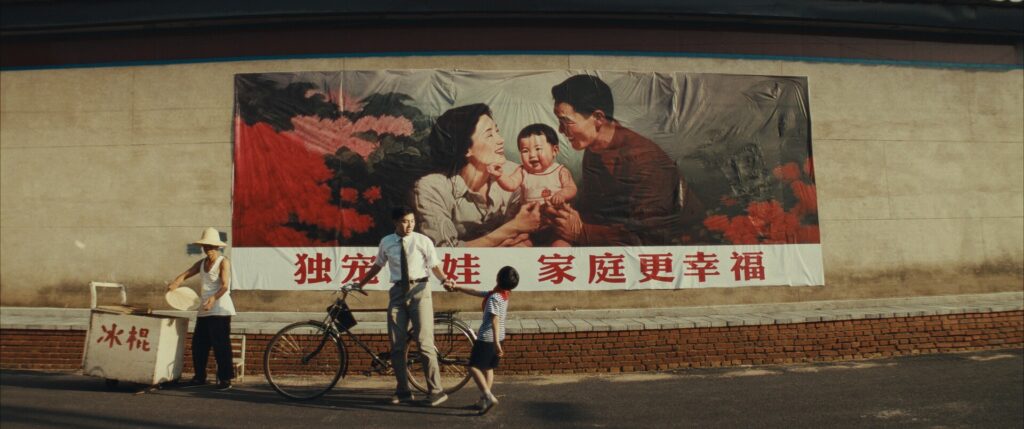UNTIL HE’S BORN – Q&A with Director Qingxuan Wang and Producer Chris Zilong Wang
Written and directed by Qingxuan Wang, Until He’s Born is a poignant tribute to her family and those affected by China’s one-child policy. Set in 1980s China, the short film follows Zheng Yuanwang, who inadvertently causes the death of his unborn brother and embarks on a journey to confront years of guilt and pain. Catherine T. Nguyen: Could you share the inspiration behind Until He’s Born and your personal connections to the story? Qingxuan Wang: I was born in 2005 and witnessed the last decade of China’s one-child policy. When I was 5 years old, my mom got pregnant again, and I felt really jealous and worried about losing my parents’ attention. Later, my mom chose to have an abortion in compliance with the one-child policy. For a long time, I felt guilty, thinking that my hostility had caused the loss of my unborn sibling. However, as I grew older, I realized that the one-child policy was the true cause. I’ve had this conversation with other people my age who grew up under the same circumstances, and I came to understand that my experience of having an unborn sibling was not unique. It became almost a shared trauma within our generation. So, this story is for my mom, for me, and for this generation of Chinese youth. Chris Zilong Wang: I think 99.9% of the people around me are only children. Most of us, especially when the new second-child policy came into effect, were around 8 or 9 years old. Our parents would often ask us if we wanted a brother or sister, and our answer was always, “No, I don’t want to share the attention or love from my parents with another sibling.” I think that’s a natural reaction for most children around that age. I feel Qingxuan really captured that feeling in the story. You can call it bias or natural instinct. Catherine: I noticed that the short film features a dual narrative thread. Can you elaborate on this creative decision and why you wanted to structure the story this way? Qingxuan: I chose to structure it this way to intertwine Zheng’s childhood memories with his journey to find the headstone of his unborn brother. This journey highlights the significance of memories in shaping an individual’s growth, as this trauma affects not only childhood but also later stages of development. Coming to terms with these memories becomes a major turning point for Zheng. Catherine: I think it’s so special that your team got to film in China. You really can’t replicate the authenticity of filming on location. What was the experience like? Qingxuan: In China, we had to deal with many local organizations and fill out numerous applications to obtain all the necessary permits for filming. However, there were clear advantages. Since my story is set in a Chinese family from the 1980s, filming directly in China was undoubtedly the most sensible, authentic, and straightforward choice for the film. Securing the main locations was extremely challenging. For the theater scene, I needed a large space to convey a sense of loneliness, and I specifically wanted an old-style theater. Fortunately, it worked out well because the theater we used was about to undergo renovation, and it already had an abandoned look. They even delayed the renovation by a week so I could film there. Catherine: I thought the child actors did really well. How was it like working with young children? Qingxuan: I must say, working with child actors can be challenging for new directors like me, especially since this was my first time working with children. However, it turned out to be the most rewarding aspect of shooting this short film, as it made me reflect on the importance of communication between the director and actors of any age. Before filming began, I set aside time to hang out with the children and their mothers, as I wanted to first build a friendly relationship with them. I believe the most important point is to remind parents not to blame or correct their child if their performance isn’t perfect, and to avoid instructing them. Sometimes, a child’s natural instincts can add unexpected and positive elements to the film. Catherine: What has been your favorite memory from making this film? Qingxuan: A moment that left a particularly deep impression on me was when my parents watched the final cut. They told me they had never blamed me for anything regarding my unborn sibling. Even though my parents were very supportive throughout the entire process, we come from a very traditional and reserved Asian family, where we rarely express our emotions or love openly. That’s why this moment will stay with me forever, and it’s also a big part of why I made this movie. I hope we can watch it together during my screening. Catherine: What do you hope audiences will take away after watching this short? Qingxuan: I hope that by following Zheng’s perspective and story, the audience can gain insight into the unique memories of our generation, and feel how closely personal tragedy is intertwined with the larger tragedies of the era. The character of the unborn brother adds an element of supernatural realism and carries my good wishes for the audience. Many people are still struggling to heal from the traumas and hardships of those 36 years, and I hope my film can offer a chance to make peace with some memories and an opportunity to reconcile. Chris: I think in general, the film brings back the issues of the time and immerses the audience into that era. Hopefully, it allows people to imagine what they would do in a similar situation. Watch Until He’s Born and other student short films on November 16th at 1pm at the Moore College of Art & Design. Click here to purchase tickets to Breaking the Frame: Student Shorts.
UNTIL HE’S BORN – Q&A with Director Qingxuan Wang and Producer Chris Zilong Wang Read More »


